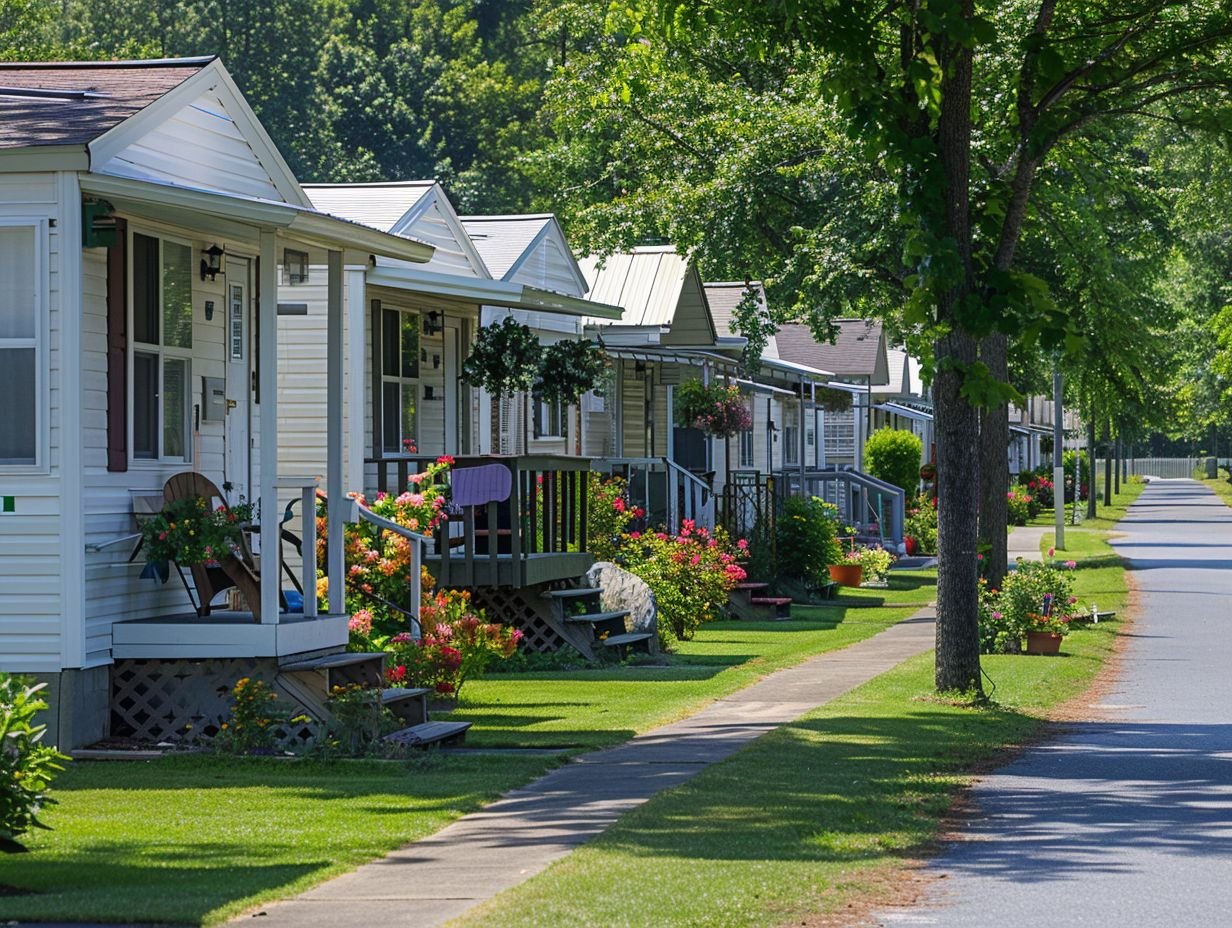Considering mobile homes as an investment option but unsure where to start? This article guides you through understanding the different types of mobile, manufactured, and modular homes, costs, and longevity. We explore the pros and cons of investing in mobile homes, including lower cost per unit and steady demand, maintenance costs, and drawbacks. Discussing how mobile homes can fit into a diversified investment portfolio, this article helps determine if investing in mobile homes is the right choice for you and how seeking professional guidance can be beneficial.
Table of Contents
ToggleKey Takeaways:
.jpg_00.jpeg)
Introduction to Mobile Homes as an Investment
Investing in mobile homes can be a lucrative choice for those looking to diversify their real estate portfolio. Mobile homes, also known as manufactured homes, offer a unique investment opportunity in the ever-evolving housing market.
One of the key benefits of investing in mobile homes is the lower purchase price compared to traditional houses, making them more accessible to a wider range of investors. In addition, mobile homes can provide a steady rental income stream, offering a stable source of revenue over time. The maintenance costs for mobile homes are often lower than for conventional properties, leading to potentially higher profit margins. With the increasing demand for affordable housing options, investing in mobile homes could prove to be a wise long-term investment strategy. Mobile homes also have the advantage of being movable, allowing for flexibility in relocation or resale if needed.
Understanding the Types: Mobile vs. Manufactured vs. Modular Homes
When considering mobile homes as an investment, it’s essential to distinguish between the various types available, including mobile homes, manufactured homes, and traditional homes. Each type comes with its own unique set of characteristics and investment potential.
Mobile homes are typically the most affordable option among the three, offering a lower initial investment. They are also subject to quicker depreciation rates compared to manufactured and traditional homes.
On the other hand, manufactured homes, while more expensive upfront, tend to hold their value better over time and can offer a more stable investment.
Traditional homes, although generally the costliest to purchase and maintain, often see consistent appreciation in value and can provide a solid long-term investment option.
Exploring the Cost and Longevity of Mobile Homes
Understanding the costs associated with mobile homes and their longevity is crucial for prospective investors.
Mobile homes offer a relatively affordable entry point into the real estate market. It’s important to consider the initial investment, depreciation rates, and ongoing maintenance requirements. The initial cost of purchasing a mobile home can vary based on factors like size, location, and age.
Depreciation rates also play a significant role in the eventual value of a mobile home. While traditional homes tend to appreciate over time, mobile homes generally depreciate in value.
Plus the initial investment, ongoing maintenance is another expense to consider. Regular upkeep, repairs, and upgrades are essential to maintain the condition and functionality of a mobile home. These maintenance costs can add up over time and should be factored into the overall cost of ownership.
Assessing Mobile Homes as an Investment Option
When assessing mobile homes as an investment option, it’s essential to analyze their potential for value appreciation within the real estate market.
Location within a mobile home park can play a significant role in determining the resale value and desirability of the property. Properties situated in well-maintained parks with amenities such as clubhouse, swimming pools, and recreational facilities tend to attract more buyers and command higher prices. The overall condition of the mobile home, including its age, size, layout, and upgrades, can influence its market value. An upgraded kitchen, modern appliances, and well-maintained landscaping can enhance the property’s appeal and contribute to its appreciation over time.
Pros and Cons of Investing in Mobile Homes
Investing in mobile homes comes with its own set of pros and cons. While mobile homes offer affordability and potential for passive income, there may be concerns regarding the quality, demand, and stigma associated with this type of investment.
On the positive side, mobile homes are often more affordable than traditional houses, making them an attractive option for entry-level investors or those looking for an additional stream of income. The potential for passive income from renting out mobile homes can also be appealing, especially in areas with high demand for affordable housing.
Challenges can arise when it comes to the quality of mobile homes. Some investors may find that maintenance costs are higher than anticipated, or that the resale value of mobile homes can be lower compared to other types of residential properties.
The demand for mobile homes may fluctuate based on economic conditions and location, which can impact the investment’s profitability. There is a lingering stigma attached to mobile homes, with some individuals associating them with lower socio-economic status or lesser quality, potentially affecting the property’s market perception.
Maintenance Costs and Drawbacks
.jpg_01.jpeg)
Maintenance costs and potential drawbacks are essential considerations for mobile home investors. While these properties offer affordability, ongoing maintenance expenses and associated drawbacks may affect long-term investment value.
One key aspect to bear in mind is that, due to the nature of mobile homes being more susceptible to wear and tear, the maintenance costs can add up significantly over time. From regular repairs and upgrades to dealing with weather damage, these expenses can impact the overall profitability of the investment.
Mobile homes are often subject to depreciation, which means that their value may decrease over time, potentially affecting the resale or rental income potential. This, coupled with the stigma sometimes associated with mobile home investments, poses a challenge for investors looking to maximize their returns.
Building a Diversified Portfolio with Mobile Homes
Including mobile homes in a diversified investment portfolio can provide investors with exposure to the housing market while potentially generating passive income streams. By strategically adding mobile homes to their portfolio, investors can enhance their overall investment strategy.
Mobile homes offer investors a unique opportunity to tap into the real estate sector without the higher costs associated with traditional properties. Their relatively lower entry barriers make them attractive for those looking to diversify their investment holdings. Mobile homes can be a stable source of passive income through rental payments, offering a steady cash flow over time.
-
Furthermore, mobile homes can act as a hedge against market volatility, as they are less susceptible to economic downturns compared to other real estate assets. This resilience enhances the overall stability of an investment portfolio, reducing the risk of significant losses during challenging market conditions.
Is Mobile Home Investment Right for You?
Evaluating the suitability of mobile home investments requires a careful analysis of your investment goals, the demand for such properties, and any zoning restrictions that may impact your investment strategy. Understanding these factors is crucial in determining if mobile home investment aligns with your financial objectives.
When considering investing in mobile homes, it’s essential to research the market demand for these properties within your targeted location. Market demand can significantly affect the potential returns on your investment. Be aware of any unique zoning regulations that may impact the setup and expansion of mobile home communities. These regulations can vary from area to area, so thorough due diligence is necessary to identify any hurdles that may affect your investment plans.
Professional Guidance in Mobile Home Investments
Seeking professional guidance when looking into mobile home investments can offer valuable insights into crafting a successful investment strategy. By consulting with experts familiar with mobile home investments, investors can optimize their passive income potential and portfolio diversification.
Professionals in the field provide a deep understanding of the mobile home market dynamics, helping investors make well-informed decisions. Their expertise can uncover hidden opportunities and mitigate risks, guiding investors towards profitable ventures. These experts can offer strategic advice on property management, financing options, and legal considerations specific to mobile home investments.
Consulting Legal and Real Estate Professionals
When engaging in mobile home investments, consulting with legal and real estate professionals can provide critical assistance in navigating investment strategies, understanding financing options, and ensuring compliance with relevant regulations. Professionals can offer tailored advice to optimize investment outcomes.
In the realm of real estate investing, the expertise of legal and real estate professionals is paramount. Real estate professionals bring in-depth knowledge of the market trends, property valuation techniques, and potential income streams from mobile home investments.
On the other hand, legal professionals play a crucial role in ensuring that all documentation and transactions adhere to the legal standards and regulations governing mobile home investments.
Together, these professionals can help investors create comprehensive investment plans, evaluate risks, and explore various financing solutions to maximize returns and mitigate potential legal liabilities.
Conclusion and Decision-Making for Mobile Home Investments
Deciding on mobile home investments involves weighing factors such as market value, depreciation risks, and potential exposure to natural disasters. By carefully considering these elements, investors can make informed decisions that align with their financial objectives.
Assessing market value requires thorough research on property prices in different locations, local demand trends, and potential for appreciation. Understanding the factors contributing to depreciation risks is crucial, including age of the mobile home, maintenance history, and overall condition. When evaluating potential exposure to natural disasters, investors must study historical data on occurrences like hurricanes, floods, or earthquakes, considering insurance options and mitigation strategies to manage risk effectively.
Is Investing in Mobile Homes Right for You?
.jpg_10.jpeg)
Determining whether investing in mobile homes aligns with your investment goals and risk tolerance requires a careful evaluation of the demand for such properties, their suitability to your portfolio, and any zoning restrictions that may impact your investment strategy.
Mobile homes often cater to a niche market seeking affordable housing options or retirees looking for downsizing solutions. Analyzing the local real estate trends, population demographics, and economic conditions in the areas where mobile homes are prevalent can provide valuable insights for your investing decisions.
Considering factors like maintenance costs, potential rental income, and financing options specific to mobile homes is crucial to ascertain whether your financial objectives align with the characteristics of this asset class.
Evaluating the Suitability of Mobile Home Investments
Evaluating the suitability of mobile home investments involves analyzing the current housing market conditions, available financing options, and the significance of land ownership in mobile home investment strategies. Understanding these factors is crucial for making informed investment decisions.
When considering the housing market trends, it is essential to assess factors such as demand for affordable housing, population growth rates, and the overall economic stability of the region. These elements play a significant role in determining the potential profitability of mobile home investments.
Exploring different financing options, including traditional mortgages, personal loans, or seller financing, can help investors secure the necessary funds to acquire mobile homes. The ownership of the land where the mobile home is placed can greatly impact the long-term value and potential appreciation of the investment.
Professional Guidance in Mobile Home Investments
Seeking professional guidance when looking into mobile home investments can offer valuable insights into crafting a successful investment strategy. By consulting with experts familiar with mobile home investments, investors can optimize their passive income potential and portfolio diversification.
These experts have a deep understanding of the nuances in the mobile home market, which can help investors navigate potential challenges and capitalize on opportunities that may not be apparent to those without specialized knowledge.
Professionals in this field can assist in identifying lucrative investment options, understanding legal regulations, and leveraging industry trends to maximize returns.
Through their experience and network, they can provide access to valuable resources and connections, paving the way for sustainable growth and long-term success in mobile home investments.
Consulting Legal and Real Estate Professionals
When engaging in mobile home investments, consulting with legal and real estate professionals can provide critical assistance in navigating investment strategies, understanding financing options, and ensuring compliance with relevant regulations. Professionals can offer tailored advice to optimize investment outcomes.
Legal professionals play a vital role in ensuring that all transactions comply with legal frameworks and regulations, thereby safeguarding the investor’s interests. They help in drafting and reviewing contracts, conducting title searches, and overseeing the closing process.
On the other hand, real estate professionals leverage their expertise to identify lucrative investment opportunities, negotiate deals, and assess property values. Their market knowledge and networking skills can be invaluable in spotting potential pitfalls and maximizing returns.
Together, these professionals form a crucial support system that enables investors to make informed decisions, mitigate risks, and achieve their financial goals in the dynamic landscape of mobile home investing.
Exploring Additional Learning Resources
For those looking to expand their knowledge of mobile home investments, exploring additional learning resources can provide valuable insights into crafting effective investment strategies. By accessing dedicated learning centers and subscribing to newsletters, investors can stay informed and enhance their investment expertise.
Continuing education in the realm of mobile home investments is crucial for staying ahead in the industry. Keeping abreast of market trends and regulations is instrumental in making informed decisions and maximizing profits. Educational platforms offer a plethora of resources ranging from case studies to webinars, catering to both novice and seasoned investors. Networking opportunities through these platforms can lead to valuable connections and potential partnerships, fostering growth and success in the mobile home investment sector.
Frequently Asked Questions
Are mobile homes a good investment?
.jpg_11.jpeg)
FAMobile homes can be a good investment for some, but it depends on individual circumstances.
What are the benefits of investing in a mobile home?
FAMobile homes often have lower upfront costs and can provide a steady stream of rental income.
How do mobile homes compare to traditional homes in terms of investment?
FAMobile homes typically have lower maintenance and insurance costs, making them a potentially more affordable investment option compared to traditional homes.
Are there any risks associated with investing in mobile homes?
FAAs with any investment, there are risks involved with mobile homes, such as potential fluctuations in the housing market and tenant turnover.
What should I consider before investing in a mobile home?
FAIt’s important to research the local housing market, potential rental income, and maintenance costs before making a decision to invest in a mobile home.
Can I make a profit by investing in a mobile home?
FAWhile there are no guarantees, investing in a well-maintained and properly managed mobile home can potentially lead to a profitable return on investment.





